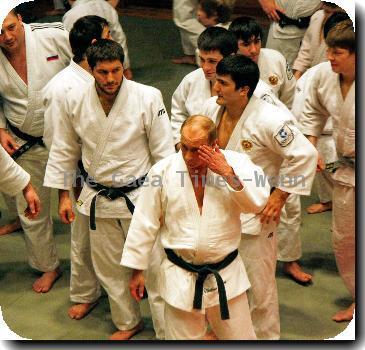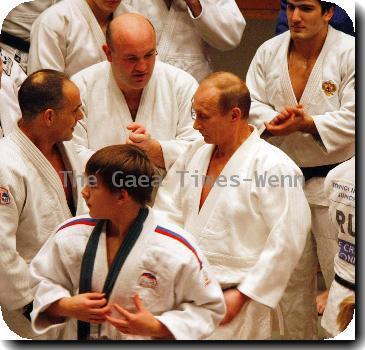Tragic plane crash brings ‘emotional breakthrough’ to Polish-Russian relations haunted by past
By Lynn Berry, APTuesday, April 13, 2010
Russians’ outpouring of emotion touches Poles
MOSCOW — The plane crash in Russia that killed the Polish president and a long list of notable Poles has brought a sudden rush of warm feelings between two nations whose relations have been fraught with historical hatreds.
In Russia, the normally stoic Vladimir Putin has set the tone with an outpouring of emotion, while Poland has been deeply moved by the gestures of sympathy from a country that had long tried to subjugate it.
In a significant step, a Russian state television network on Sunday night aired “Katyn,” a celebrated Polish film about a World War II-era Soviet massacre that looms large in Polish memory. For decades the Soviet Union denied responsibility, and even today many Russians know little about the killings.
Closer political ties still seem far off, but Poland’s foreign minister, long suspicious of Russia’s intentions, made clear the tragic plane crash also offers an opportunity.
“I don’t know if there is a political breakthrough because we have many contradictory issues with Russia, but we have an emotional breakthrough,” Radoslaw Sikorski said Monday on Radio TOK FM.
“It seems that the personal reaction of Prime Minister Vladimir Putin is the result of his realization of what Soviet Russia had done to Poland. Therefore, he felt our pain when another tragedy took place.”
The presidential plane crashed Saturday while bringing President Lech Kaczynski, his wife, lawmakers, military commanders, priests and historical figures to a ceremony in memory of the 22,000 Polish officers and intellectuals executed in 1940 by Soviet secret police in the Katyn forest and elsewhere.
Relatives of victims of the massacre were among the 96 people who died when the plane went down.
Putin flew immediately to the crash site in western Russia, where he embraced Polish Prime Minister Donald Tusk. On Sunday, holding a bouquet of red roses, Putin appeared genuinely shaken as he escorted Kaczynski’s body to a plane to be flown to Warsaw.
“This is of course first and foremost Poland’s tragedy and that of the Polish people, but it is also our tragedy. We mourn with you,” he said in an interview with Polish television.
His words clearly touched a chord with ordinary Poles.
“Putin’s gestures are striking. He’s not a soft kind of person but I get a positive impression,” said Slawomir Pawelski, 88. “It’s sad the reconciliation is happening under such painful circumstances and not on the normal diplomatic or political level, but let’s be happy with what we have because it opens the door to friendship.”
Russia declared Monday a national day of mourning, an unusual and possibly unprecedented step in honoring citizens of another country. President Dmitry Medvedev and former Soviet leader Mikhail Gorbachev went to the Polish Embassy in Moscow to pay their respects and write in a book of condolences.
It was under Gorbachev in 1990 that the Soviet Union first acknowledged responsibility for the Katyn massacre, which until then the Soviets had blamed on Nazi forces that invaded Russia in 1941.
That was also the official line in Poland until the fall of communism in 1989, but Poles had always known the truth and the cover-up only fed animosity toward Russia.
To this day, many Russians know little or nothing about Katyn. In a poll conducted March 10 by the respected Levada Center, only 19 percent said the Polish officers were shot on dictator Josef Stalin’s orders. Twenty-eight percent said Nazi Germany had ordered the executions, while 53 percent said they could not answer. The poll of 1,600 Russians nationwide had a margin of error of 3.4 percentage points.
That could change after the nationwide broadcast of Andrzej Wajda’s film “Katyn” on Sunday evening. The 2007 film, which was not distributed in Russia, was first shown last week on the state cultural channel, which has a limited audience.
Eugeniusz Smolar, director of the Center for International Relations in Warsaw, predicted that the film would help Russians come to terms with their own painful history under Stalin.
“It is important for our better relations in the future that the Russians conduct a debate on the past among themselves, not necessarily with the help or participation of the Poles,” he said, “But this will also influence in a positive manner the future of Polish-Russian relations because we will understand each other better,” he said.
Relations have been improving lately under Tusk, who met with Putin in Katyn on April 7. Even Sikorski, who has made some strong critical statements about Moscow in the past, has toned down his rhetoric as Poland’s chief diplomat.
Masha Lipman, a political analyst at the Carnegie Moscow Center, said the sudden goodwill between Russians and Poles offers a chance to overcome the dark past, but she was skeptical it would be seized.
For Poland, the litmus test will be whether Russia shows a new willingness to fully expose the crimes committed against Poles under Stalin, she said.
Russia has refused to fully open the Katyn archives, apparently unwilling to reveal the names of those who carried out the executions, and also has denied requests to rehabilitate the murdered Polish officers.
“Katyn has always been the major thing for Poland,” Lipman said. “Without progress on Katyn there will be no improvement in relations.”
Another concern, she said, was whether anti-Russian sentiments would play a part in Poland’s presidential election campaign and, if so, whether Russia would be able to show restraint.
The suspicions on both sides still run deep.
“Putin’s behavior, Russians’ behavior, the Russian authorities’ behavior is very surprising, but history teaches us about being careful of what our eastern neighbors do,” said Katarzyna Polak, a 30-year-old Warsaw resident.
“I keep wondering if it is all sincere and true. I’m afraid Putin’s gestures are calculating. It’s hard to believe he is acting spontaneously.”
________
Associated Press Writers Vanessa Gera and Marta Kucharska in Warsaw contributed to this report.
Tags: Accidents, Eastern Europe, Europe, Moscow, Nazism, Poland, Russia, Transportation, Vladimir Putin

